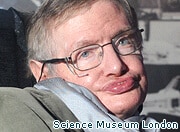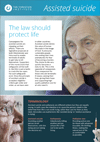Professor Stephen Hawking has changed his mind to support assisted suicide having previously argued that “there is always hope”.
Dr Peter Saunders, head of pro-life group Care Not Killing, says it’s ironic that Prof Hawking supports assisted suicide when he is living proof that doctors can be very wrong about prognoses.
Prof Hawking, 71, was diagnosed with motor neurone disease when he was 21 and told he had just two or three years to live.
Animals
In 1985 he was placed on a life support machine following a bout of pneumonia but his first wife, Jane Hawking, chose to fly him back to Cambridge from Geneva rather than switch off his life support.
He went on to recover from pneumonia and complete his bestseller ‘A Brief History of Time’, which sold more than 10 million copies worldwide.
In an interview with the BBC, Prof Hawking expressed his support for assisted suicide, saying: “We don’t let animals suffer, so why humans?”
Pressurised
He said: “I think those who have a terminal illness and are in great pain should have the right to choose to end their lives and those who help them should be free from prosecution.
“But there must be safeguards that the person concerned genuinely wants to end their life and they are not being pressurised into it or have it done without their knowledge or consent, as would have been the case with me.”
Despite containing so-called safeguards, parliamentarians have repeatedly rejected attempts to change the assisted suicide law in Britain because of concerns for public safety.
Vulnerable
Dr Saunders said: “Their judgement was that any change in the law to allow assisted suicide or euthanasia would place pressure on vulnerable people – those who are elderly, sick, disabled or depressed – to end their lives for fear of becoming a financial or emotional burden.
“Such fears would be acutely felt at a time of economic recession when many families are struggling to make ends meet and health budgets are being cut. Moreover subtle forms of coercion within families are extremely difficult to detect, even by skilled health professionals.”
Two bills, one in the House of Lords and one in Scotland are currently awaiting debate.


